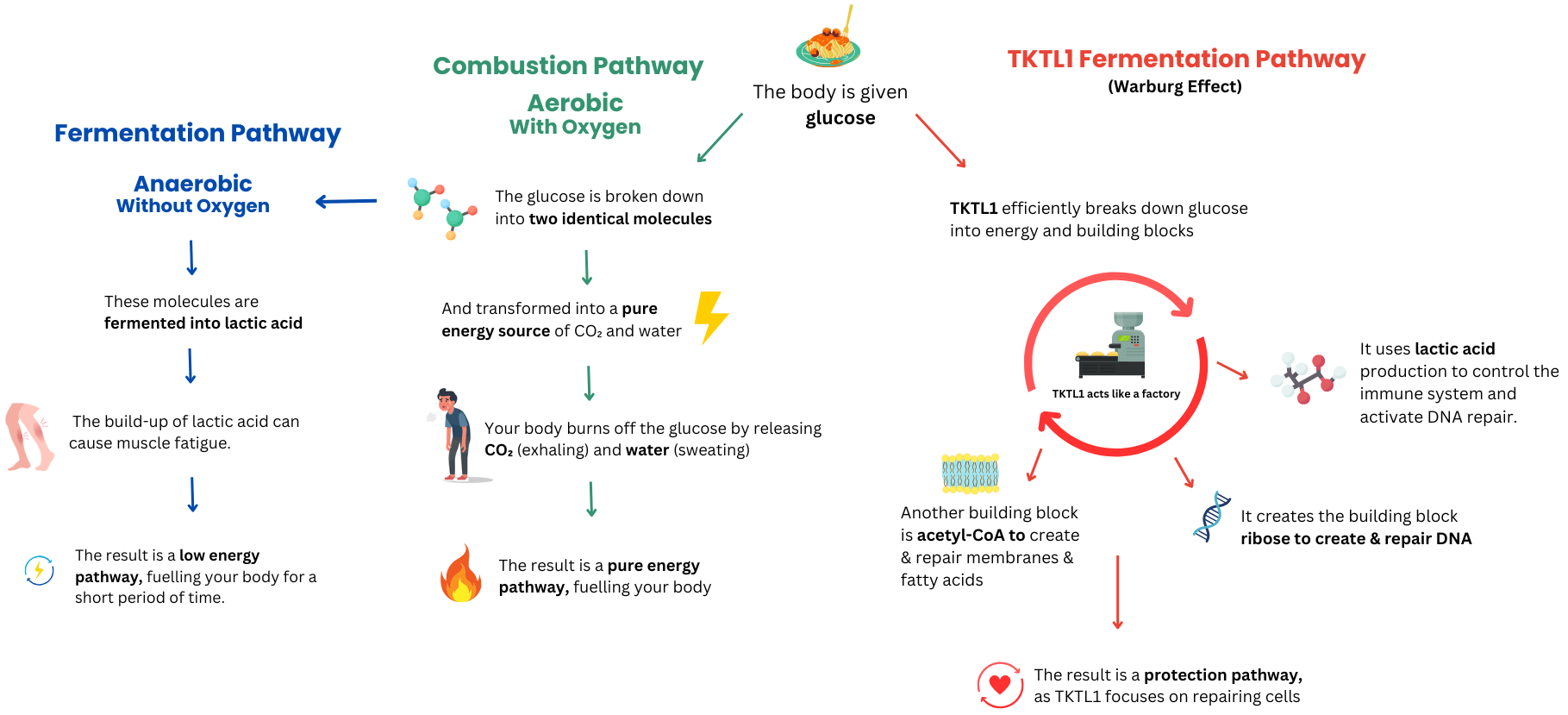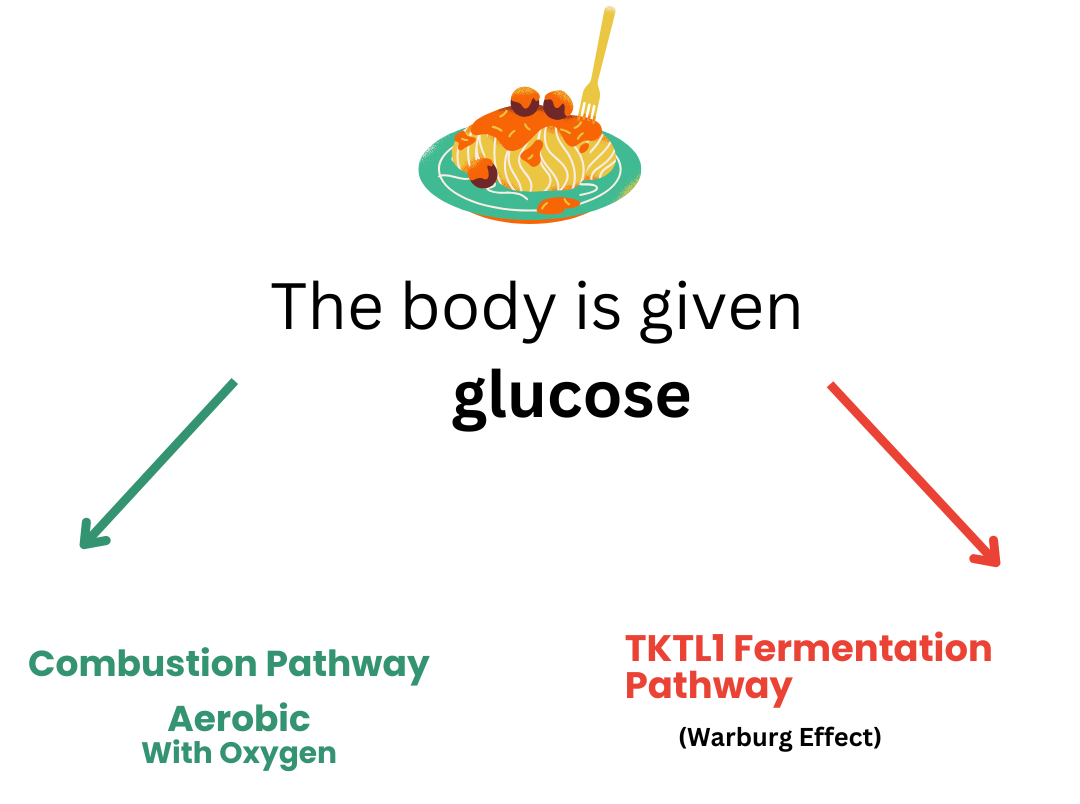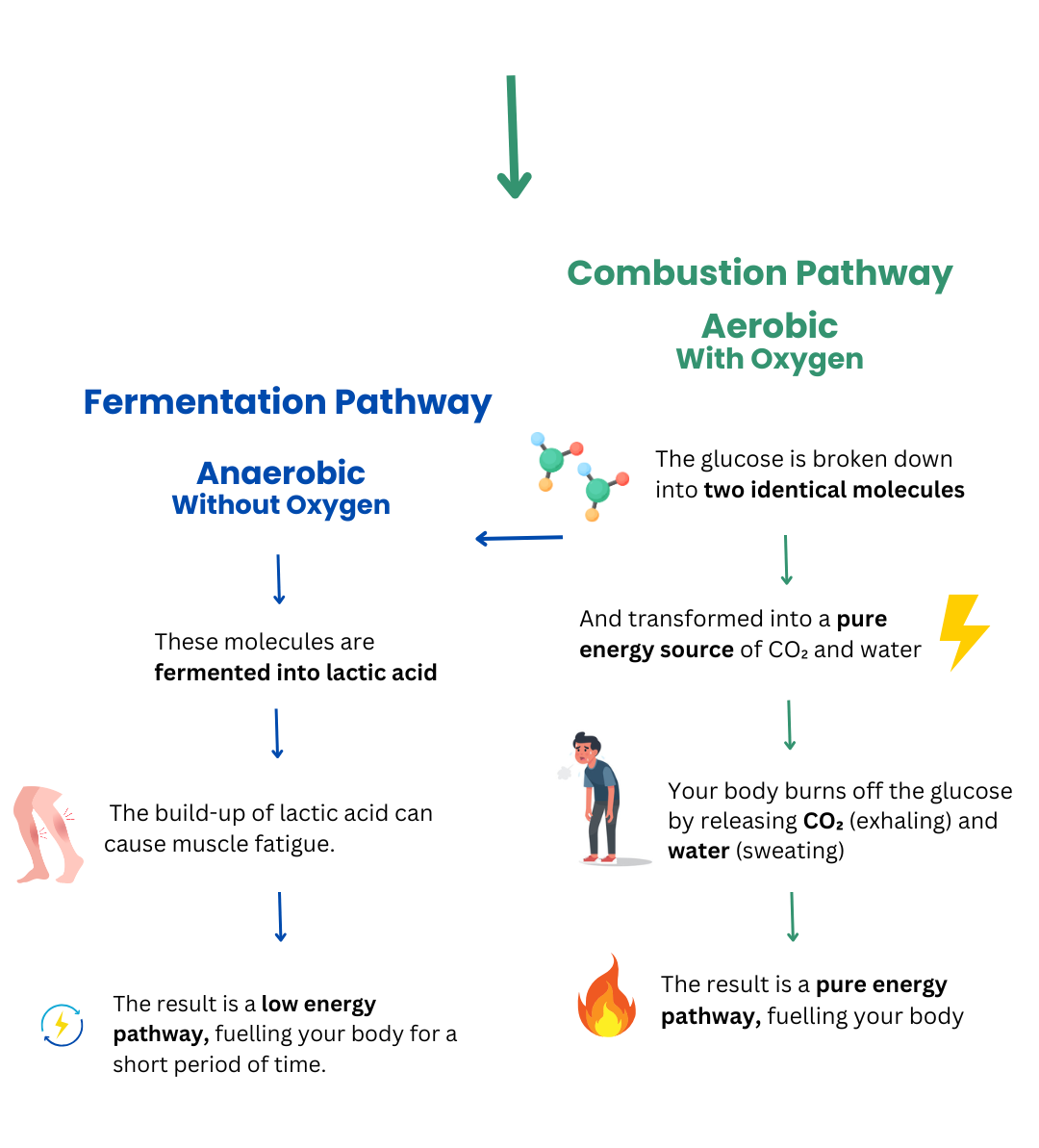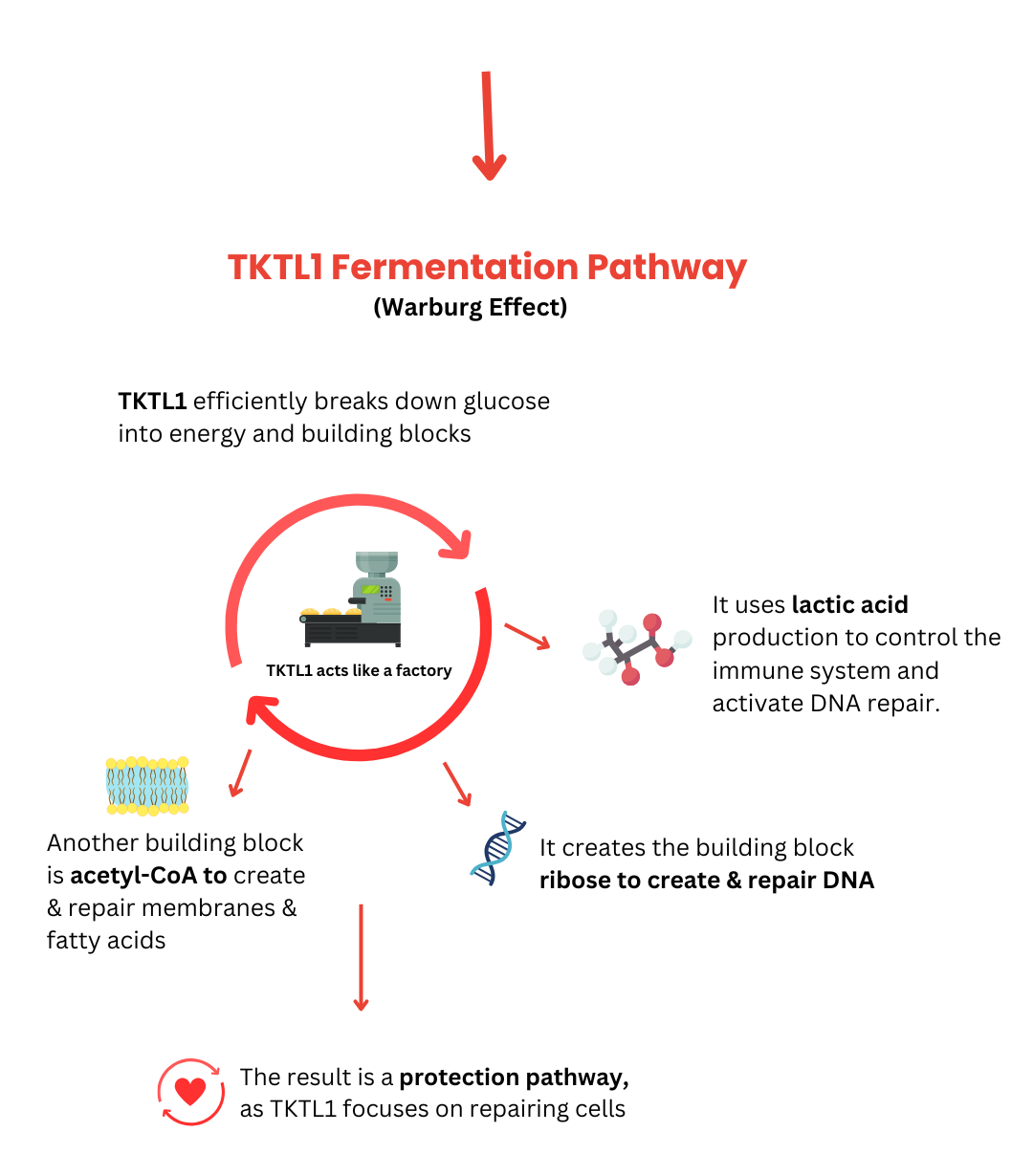What is Ribose?
Ribose is a simple sugar found in all living cells, including our own DNA and RNA.
It plays an essential role in cellular energy production and the synthesis of nucleotides, the building blocks of DNA and RNA. It’s also an essential component of adenosine triphosphate (ATP), which is the primary molecule that stores and transfers energy in our cells.
Recently, the enzyme TKTL1 has been shown to play a major role in converting glucose into ribose to support the formation of new cells. It’s therefore extremely important for the formation of new cells and tissue renewal.
Ribose occurs naturally in foods such as meat, dairy products, and vegetables like asparagus and broccoli. It is also available as a supplement, often used by athletes for its ability to boost exercise performance and recovery. Ribose is derived from corn, and is a novel food approved by the European Food Safety Authority (EFSA).
Ribose has natural mildly sweet taste, which is slightly less sweet than classic sugar.
Ribose at a glance
- Prevents high blood glucose levels
- Negative glycaemic index
- Prevents and inhibits insulin resistance
- Provides steady, long-lasting energy
More and more independent accredited research highlights additional benefits of ribose, including its ability to reduce muscle fatigue and lower stress levels.

What makes Ribose special
Enhances energy levels
Promotes cell & tissue renewal
Reduces muscle fatigue
Balances blood sugar levels

Support Muscle Performance & Recovery
Ribose enhances energy recovery (via ATP synthesis), muscle performance and tolerance to stress. This helps the body rebalance after strenuous activity.
Ribose is metabolized via the pentose phosphate pathway, which generates energy in the form of ATP. It is particularly important for cells that require a lot of energy, such as muscle cells. Adding ribose to your diet can help enhance exercise performance by increasing energy production and reducing muscle fatigue.
Taking just 5 grams of ribose a day has been shown to boost energy levels by an average of 61% over 3 weeks.
In a study of patients with chronic fatigue syndrome and fibromyalgia, ribose significantly helped relieve their symptoms and increase their overall wellbeing.
Athletes also benefit from this energising sugar; in one study athletes reported significant gains in muscle strength and endurance from ribose supplementation.
Important: Ribose promotes cell renewal in healthy bodies, which is very beneficial. However, if the body is compromised by cancer or a virus, such as SARS-COV2, then ribose could fuel the growth of the cancer cells or the virus. Therefore, it is important to know if your body is in healthy state before consuming ribose.
What the science says about ribose?
-
 By increasing the levels of ribose in the body, it can help to improve energy levels and reduce fatigue.
By increasing the levels of ribose in the body, it can help to improve energy levels and reduce fatigue.
-
 Ribose is an important component of nucleotides, the building blocks of RNA and DNA, and can help to support cognitive function and memory. Ribose supplements have been shown to improve cognitive performance, reduce mental fatigue, and increase alertness. Ribose supports brain function by improving energy metabolism and reducing oxidative stress in the brain.
Ribose is an important component of nucleotides, the building blocks of RNA and DNA, and can help to support cognitive function and memory. Ribose supplements have been shown to improve cognitive performance, reduce mental fatigue, and increase alertness. Ribose supports brain function by improving energy metabolism and reducing oxidative stress in the brain.
-
 Ribose has been shown to have positive effects on heart health by improving blood flow and reducing inflammation. Ribose helps myocardial cells, restoring ATP, increasing contractions, and increasing the amount of blood flow into the heart and preventing “reperfusion injury” and free-radical damage to the tissue.
Ribose has been shown to have positive effects on heart health by improving blood flow and reducing inflammation. Ribose helps myocardial cells, restoring ATP, increasing contractions, and increasing the amount of blood flow into the heart and preventing “reperfusion injury” and free-radical damage to the tissue.
-
 Ribose has been shown to have antioxidant properties and can help to protect cells from damage caused by free radicals. It also plays a role in the synthesis of ATP, the energy currency of the cell, and can help to improve mitochondrial function.
Ribose has been shown to have antioxidant properties and can help to protect cells from damage caused by free radicals. It also plays a role in the synthesis of ATP, the energy currency of the cell, and can help to improve mitochondrial function.
-
 Ribose plays a key role in energy production in the body. It is a critical component of ATP, the molecule that provides energy for all cellular processes.
Ribose plays a key role in energy production in the body. It is a critical component of ATP, the molecule that provides energy for all cellular processes.
-
 Ribose supports the growth and maintenance of healthy gut bacteria, including Lactobacilli and Bifidobacteria. It also helps to reduce gastrointestinal symptoms such as bloating, cramping and diarrhea.
Ribose supports the growth and maintenance of healthy gut bacteria, including Lactobacilli and Bifidobacteria. It also helps to reduce gastrointestinal symptoms such as bloating, cramping and diarrhea.
-
 Ribose plays an important role in the function of the immune system by supporting the production and maintenance of immune cells, including T-cells and B-cells. It also helps to reduce inflammation and oxidative stress in the body.
Ribose plays an important role in the function of the immune system by supporting the production and maintenance of immune cells, including T-cells and B-cells. It also helps to reduce inflammation and oxidative stress in the body.
-
 Ribose is a key component in the production of ATP, which is essential for energy production in the body. It can also help to improve exercise performance and reduce fatigue in those with chronic fatigue syndrome or fibromyalgia.
Ribose is a key component in the production of ATP, which is essential for energy production in the body. It can also help to improve exercise performance and reduce fatigue in those with chronic fatigue syndrome or fibromyalgia.
-
 Ribose is metabolized in the liver and has been shown to support liver function by reducing inflammation and oxidative stress. It also helps to improve energy metabolism and glucose uptake in the liver, which can benefit those with liver conditions.
Ribose is metabolized in the liver and has been shown to support liver function by reducing inflammation and oxidative stress. It also helps to improve energy metabolism and glucose uptake in the liver, which can benefit those with liver conditions.
-
 Ribose has been shown to support cardiovascular health by improving blood flow and reducing the risk of heart disease. It also helps to reduce oxidative stress and inflammation in the heart, which can improve overall heart function.
Ribose has been shown to support cardiovascular health by improving blood flow and reducing the risk of heart disease. It also helps to reduce oxidative stress and inflammation in the heart, which can improve overall heart function.
How does the calorie content of ribose compare to sucrose?
Using the classic ‘a calorie is just a calorie model’ (developed in 1848) it’s hard to see the benefits of ribose, but when we revise the model to reflect reality, we can see why it energises us very differently.
| Classic Calories | Fermenting Calories | Oxidising Calories | |
|---|---|---|---|
| Ribose | 4 kcal / g | 4 kcal / g | 4 kcal / g |
| Sucrose | 4 kcal / g | 4 kcal / g | 4 kcal / g |
Oxidising (using oxygen to release pure energy)




Making Energy from Metabolism
- Ribose directly impacts cell renewal and duplication.
- Ribose can be used to restore and repair depleted muscles and other cells after intense exercise.
- Supplementing ribose supports the body to make and transfer energy more easily.
Benefits
- Ribose is used therapeutically to treat energy deficits like chronic fatigue syndrome.
- Athletes also use it to increase energy, boost stamina, and enhance performance.
- Ribose enhances muscle recovery and reduces soreness after exercise.
- Ribose has a negative glycaemic index; it lowers blood sugar but can raise insulin.
- Ribose has mild sweet taste.
Ribose’s unique metabolic effect makes it ideal for:
Stress
Sports
Memory
Frequently asked questions
Is ribose safe?
Ribose is generally considered safe for most people to consume in moderate amounts. However, individuals with certain medical conditions such as hypoglycemia or diabetes should speak to a healthcare provider before consuming ribose. People with cancer should not consume ribose as it can promote cancer growth.
Is ribose good for diabetics?
Ribose is metabolized by the body without requiring insulin, which makes it a suitable sugar for individuals with diabetes. However, it may cause a temporary increase in blood sugar levels and should be consumed in moderation.
Can ribose be used in cooking and baking?
Ribose is less sweet than table sugar and is primarily used as a dietary supplement to support energy metabolism. It is not commonly used in cooking or baking.
Does ribose raise blood sugar levels?
Ribose is a simple sugar that is rapidly absorbed and metabolized by the body, which can result in a temporary increase in blood sugar levels.
Does ribose raise insulin levels?
Ribose is metabolized by the body without requiring insulin, which means it does not cause a significant increase in insulin levels.
Is ribose healthy?
Ribose is considered a healthy sugar when consumed in moderate amounts as it supports energy metabolism and can aid in athletic performance. It is not suitable for people with cancer.
Is ribose keto-friendly?
Ribose is a simple sugar and is not typically used in a ketogenic diet as it can cause blood sugar a temporary rise in blood sugar.
Is ribose fructose-free?
Yes, ribose does not contain fructose (making it suitable for people who are sensitive or intolerant to fructose).
Is ribose lactose-free?
Yes, ribose does not contain lactose, making it suitable for people who are lactose intolerant).
Is ribose gluten-free?
Yes, ribose does not contain gluten (but could contain traces depending on manufacturing processes).
Is ribose safe for cancer patients?
Ribose is a building block of nucleotides, which are the building blocks of DNA and RNA, therefore it can encourage the growth of cancerous tumors.
What is ribose made from?
Ribose is a naturally occurring sugar that is found in all living cells and is synthesized in the body from glucose.
What does ribose taste like?
Ribose has a slightly sweet taste, but it is less sweet than table sugar.
What is ribose?
Ribose is a simple sugar that is used by the body to synthesize ATP (adenosine triphosphate), the primary source of energy for cellular processes.
Where can I buy ribose?
The best way to incorporate ribose into your diet is by using Dr Coy’s sugar mixtures. These mixtures have been scientifically developed to help lead a healthier lifestyle. Discover the full range of Dr Coy’s sugar mixtures from our partners.
Research & Resources
Further Studies
The use of D-ribose in chronic fatigue syndrome and fibromyalgia: a pilot study.
As D-ribose has been shown to increase cellular energy synthesis in heart and skeletal muscle, this open-label uncontrolled pilot study was done to evaluate if D-ribose could improve symptoms in fibromyalgia and/or chronic fatigue syndrome patients.
The influence of D-ribose ingestion and fitness level on performance and recovery.
Skeletal muscle adenosine triphosphate (ATP) levels are severely depleted during and following prolonged high intensity exercise. this study was designed to determine what influence D-ribose might have on muscular performance, recovery, and metabolism during and following a multi-day exercise regimen.
Effects of ribose on exercise-induced ischaemia in stable coronary artery disease.
There is no established treatment specifically aimed at protecting or restoring cardiac energy metabolism, which is greatly impaired by ischaemia. Evidence that the pentose sugar ribose stimulates ATP synthesis and improves cardiac function led researchers to test the possibility that ribose increases tolerance to myocardial ischaemia in patients with coronary artery disease (CAD).

